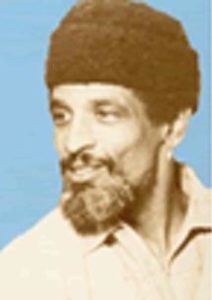
Hakim Jamal
*Hakim Abdullah Jamal was born on this date in 1931. He was a Black radical and author.
He was born Allen Donaldson in Roxbury, Boston. His father was an alcoholic, and his mother abandoned him when he was 6. Donaldson started regularly drinking alcohol when he was ten and became a heroin user at 14. In his early 20s, he spent four years in prison. Donaldson's violent temper led to his committal to a mental asylum after two attempted murders.
He later converted to the teachings of the Nation of Islam and renamed himself Hakim Jamal. He became a spokesman for the movement and contributed articles to various newspapers promoting Black Power. After Malcolm X left the Nation of Islam, Jamal supported his decision and was outspoken in his criticism of Elijah Muhammad. After Malcolm X's death, Jamal joined Maulana Karenga and others to found the "US" Organization promoting African American cultural unity. He had already circulated a self-produced magazine entitled "US," a pun on the phrase "us and them" and the accepted abbreviation of "United States ."
This promoted the idea of Black cultural unity as a distinct national identity. In 1966, they published a magazine, Message to the Grassroot, in which Karenga was chairman, and Jamal was the founder of the new group. Jamal argued that Malcolm X's ideas should be the group's primary ideological model. Jamal's views increasingly differed from Karenga's. Jamal emphasized radical politics, while Karenga wished to root Black Americans in African culture. He left "The US" to establish the Malcolm X Foundation in Compton, California.
Though married to Dorothy Jamal, Jamal had several affairs. He had a brief relationship with actress Jean Seberg. Jamal moved to London during the late 1960s, where he met Gale Benson, daughter of the British MP Leonard Plugge. Jamal and Benson traveled to America seeking funds to create a Montessori school for black children. They later joined West Indian Black Power leader Michael X in his commune in Trinidad, where Jamal wrote articles supporting the commune.
1971 he wrote his autobiography, Malcolm X and Me from the Dead Level. It was published in the U.K., and at this time, Jamal became involved in a relationship with his London editor, Diana Athill. In her memoir Make Believe, she later wrote about their romance, recording his increasing mental instability and alleged that he made repeated assertions that he was God. Benson traveled to America to raise funds but was unsuccessful. Shortly after returning to Trinidad in 1972, she was murdered by Michael X and his associates.
Jamal eventually returned to his wife and moved back to Boston, where he revived his role as director of the Malcolm X Foundation. On May 1, 1973, Jamal was killed when four men burst into his apartment in Boston. Police attributed the crime to a factional dispute linked to Jamal's attacks on Elijah Muhammad. It was blamed on a group known as De Mau Mau. Five members of the group were convicted of involvement in the murder.